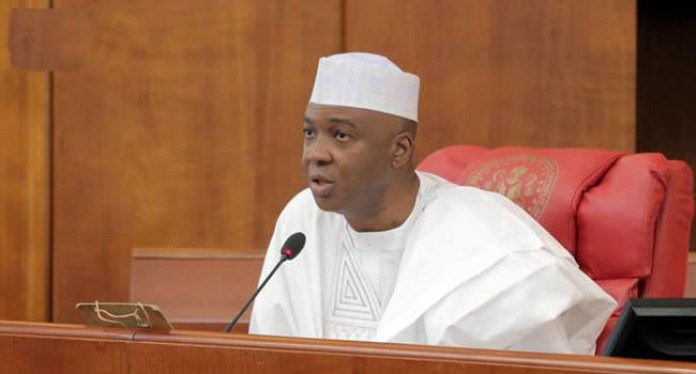The former Senate president, Bukola Saraki, while speaking at the Social Media Week in Lagos, February 26, 2016, assured Nigerians that the social media bill will never be passed into law.
Saraki said the Senate and the major users of the social media in Nigeria are on the same page and will not be paid back badly for their efforts in seeing off the last government.
According to him, “As far as I am concerned, we are all on the same side. It is like any bill, it has to go through processes. I am sure that many bills, content of those bills will not even pass second reading.
“I strongly believe that there is a role of the social media platform in our governance. You’ve helped in the election, you’ve helped in improving governance. So I don’t think there is anybody who will want to ensure you don’t play that role.
“There is no perfection in any group. Among politicians there are the good ones and bad ones. I am sure in the social media, you will see those that are responsible and those that are irresponsible.
“What is important for us is to focus on the bigger picture. Don’t let those other issues distract us. That bill is going nowhere, its dead on arrival.”
Meanwhile, the proposed enactment of the bill is not new to many Nigerians anymore when Minister of Information and Culture, Alhaji Lai Mohammed on Tuesday, November 5, said federal government had commenced the process of injecting sanity into the Social Media space to prevent it from setting the nation on fire.
“As a matter of fact, we have already put in motion the machinery for this. We have written letters to the major stakeholders who would nominate representatives and we are going to sit down together to decide on how best to confront this menace,’’ he said.
“We are glad about the criticism because what we set out to achieve is to bring the matter to the front burner of discourse. We are not under any illusion that the people will take this hook line and sinker.
“We are, however, glad that there are more people who believed that the social media poses imminent danger to the unity of Nigeria especially as they have become merchants of fake news and hate speech,” he said.
The minister noted that those who had opposed the regulation of the social media had not denied the fact that the platform was being used by purveyors of fake news and hate speech with grave consequences.
“Their concern largely, which is unfounded is that it might lead to the stifling of the freedom of press or gaggling the media. However, we want to make it clear that it is not our intention to do this.
“The only people who are afraid of the decision to sanitise the social medi and the airwaves are the purveyors of hate speech and fake news. It must be put on record that Nigeria is not the only country that is doing something about this, Germany, Egypt, Russia, India and the UK are all doing something about regulating the social media platform,’’ he said.
“This is amusing, because they should be glad as they are the one we are protecting. The honest truth is that the established, well trained professional journalists do not indulge in fake news and hate speech because they have regulatory bodies already.
“The NUJ has regulatory body and Code of Conduct and they are largely not the one responsible for the dissemination of fake news and hate speech. I am therefore, really surprised that such criticism is coming from them because they are the people we are protecting and they are the ones that will benefit the more from the government action,’’ he said.
Former lawmaker representing Kaduna Central district at the National Assembly, Shehu Sani, while speaking about the social media bill said President Muhammadu Buhari’s administration is trying to regulate social media is not to checkmate hate speech but to stifle freedom of speech by Nigerians.
Sani said: “The efforts to regulate social media is not primarily about checkmating fake news, hate speeches or defamation, but majorly about stifling freedom of speech and expression and the right to question power and hold it to account.”



Leave a Reply